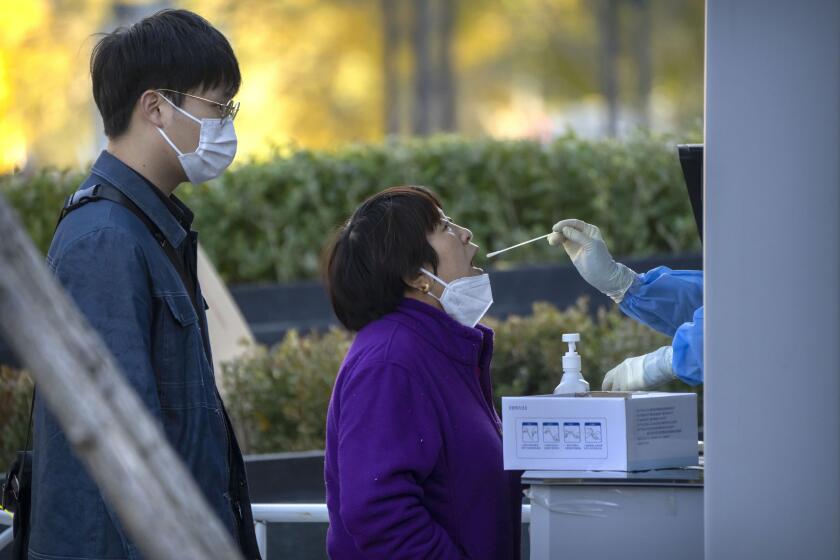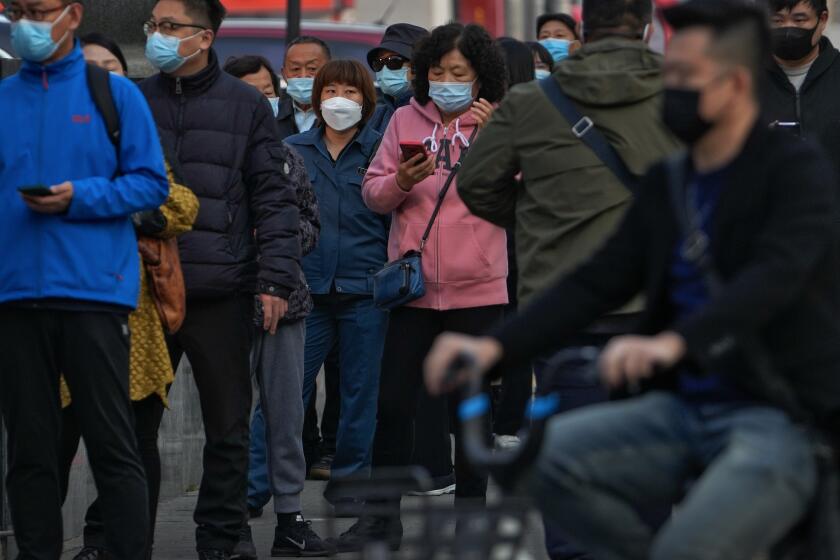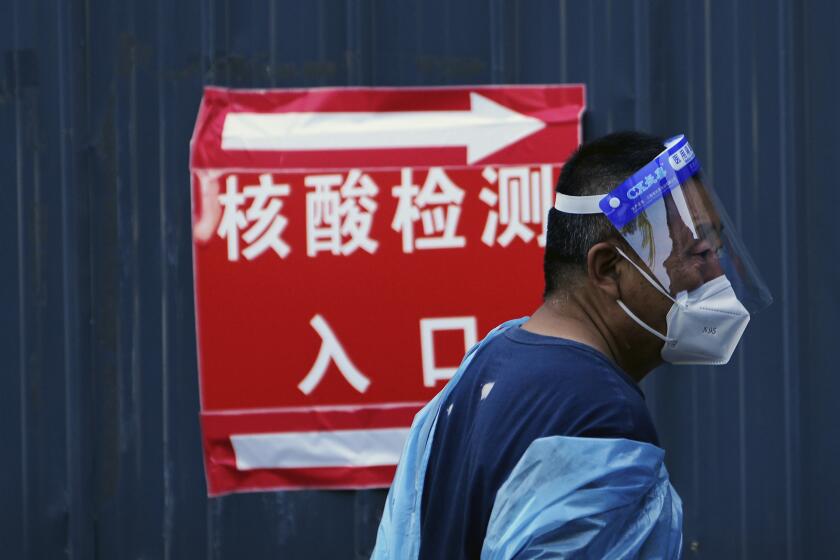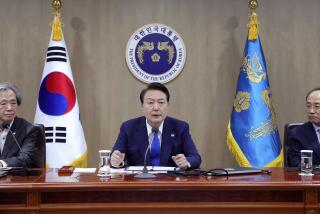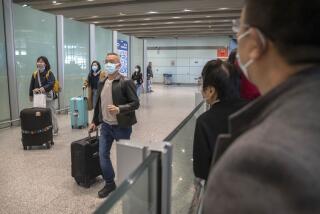China eases quarantine rules for arrivals despite rise in COVID cases
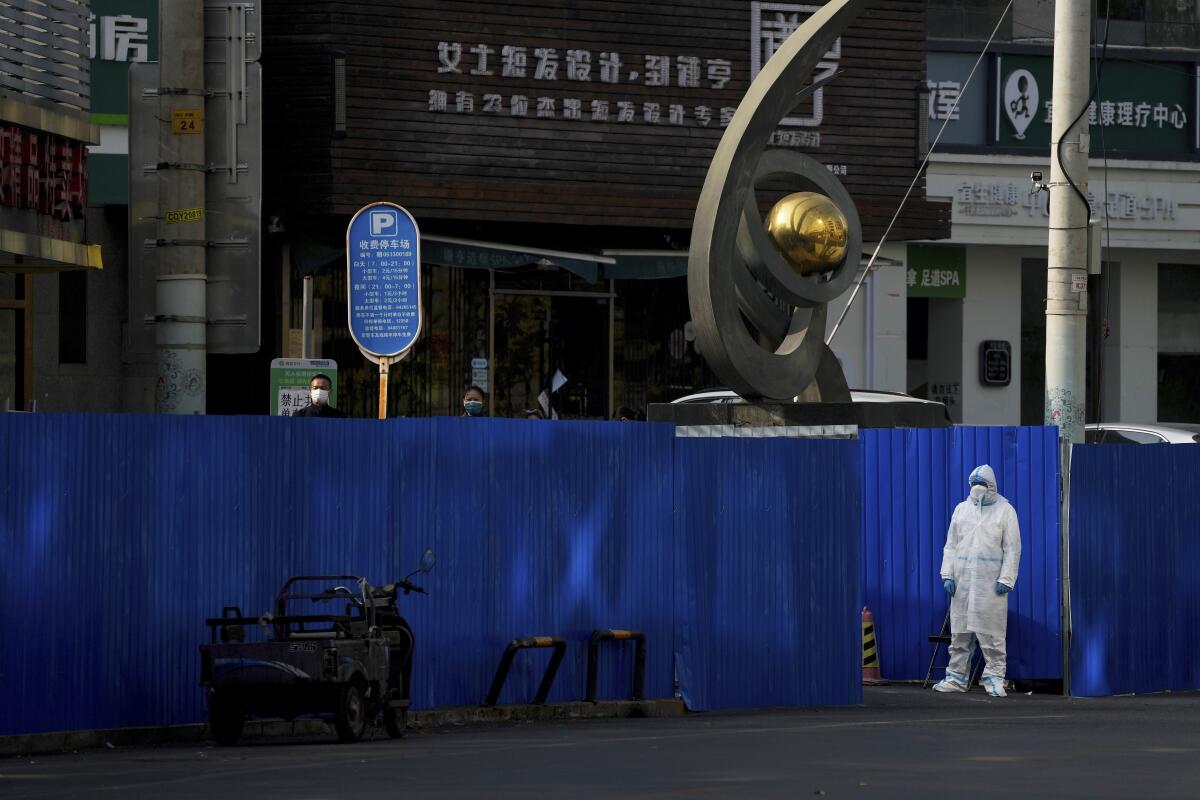
- Share via
BEIJING — Travelers arriving in China will spend less time in quarantine under changes to sweeping coronavirus controls announced Friday to reduce disruption to the economy and society.
The announcement came even as an upsurge in COVID-19 cases prompted Beijing to close parks and impose other restrictions. China reported 10,729 new cases nationwide, and more than 5 million people were confined to their homes in the southern manufacturing hub of Guangzhou and the western megacity Chongqing.
With the bulk of Beijing’s 21 million people undergoing near-daily testing, an additional 118 new cases were recorded in the sprawling capital. Many city schools switched to online classes, hospitals restricted services and some shops and restaurants were shuttered, with their staff put in quarantine. Videos on social media showed people in some areas protesting or fighting with police and health workers.
“It has become normal, just like eating and sleeping,” said food service worker Yang Zheng, 39. “I think what it impacts most is kids because they need to go to school.”
Demands for testing every 24 to 48 hours are “troublesome,” said Ying Yiyang, who works in marketing.
“My life is for sure not comparable to what it was three years ago,” said Ying.
Chinese officials are trying to quell an outcry over the death of a 3-year-old boy from a quarantined residential compound.
Family trips out of Beijing can be difficult if the mandatory smartphone app that keeps track of the user’s virus test status and whereabouts doesn’t show the green code that authorizes travel back to the Chinese capital, Ying said.
“I just stay in Beijing,” Ying said.
Numerous villages on the city’s outskirts are home to blue-collar workers whose labor keeps the city running, with many living in dormitory communities. Taxi and ride-sharing drivers said they were avoiding the areas so as not to be placed in quarantine themselves.
Lockdowns in Guangzhou and elsewhere were due to end by Sunday, but authorities have repeatedly extended such restrictions with no explanation. Chinese leaders had promised Thursday to respond to public frustration over its severe “zero-tolerance” COVID-19 strategy, which has confined millions to their homes and severely disrupted the economy.
China’s largest city, Shanghai, has started administering an aerosol COVID-19 vaccine that recipients suck in through their mouths, state media said.
Incoming travelers will be quarantined for only five days — rather than the previous seven — at a designated location, followed by three days of isolation at their place of residence, according to a notice from the State Council, China’s Cabinet.
It wasn’t immediately clear when and where the rules would take effect and whether they would apply to foreigners and Chinese citizens alike.
Relaxed standards would also be applied to foreign businesspeople and athletes, in what appeared to be a gradual move toward normalization.
Airlines will no longer be threatened with a two-week-long suspension of flights if five or more passengers test positive, the regulations said, potentially providing a major expansion of seats on such flights, which have shrunk in numbers and soared in price since restrictions were imposed in 2020.
The nighttime bus crash that killed 27 people in southwest China set off a storm of anger online over the country’s strict COVID-19 policies.
Those flying to China will need to show only a single negative test for the coronavirus within 48 hours of traveling, the rules said. Formerly, two tests within that time period were required.
China’s draconian measures have kept the infection rate relatively low but weighed on the economy and disrupted life by shutting schools, factories and shops or sealing neighborhoods without warning. With the new surge in cases, a growing number of areas are shutting down businesses and imposing curbs on movement. In order to enter office buildings, shopping malls and other public places, people are required to show a negative result from a coronavirus test taken as often as once a day.
With economic growth weakening again after rebounding to 3.9% in the third quarter compared with a year earlier, forecasters had been expecting bolder steps toward reopening the country, whose borders remain largely closed.
Business groups complain that the policies discourage foreign executives from visiting, which has prompted companies to shift investment plans to other countries. Visits from U.S. officials and lawmakers tasked with maintaining crucial Sino-U.S. trading relations amid tensions over tariffs, Taiwan and human rights have come to a virtual standstill.
Breaking News
Get breaking news, investigations, analysis and more signature journalism from the Los Angeles Times in your inbox.
You may occasionally receive promotional content from the Los Angeles Times.
Last week, access to part of the central city of Zhengzhou, home to the world’s biggest iPhone factory, was suspended after residents tested positive for the virus. Thousands of workers jumped fences and hiked along highways to escape the factory run by Taiwan’s Foxconn Technology Group. Tech giant Apple later warned that customers would have to wait longer for deliveries of its new iPhone 14 model.
China confirmed Friday that President Xi Jinping would make a rare trip abroad next week, but has given little indication of backing off on a COVID policy that the ruling Communist Party has closely tied to social stability and the declared superiority of Xi’s policies.
More to Read
Sign up for Essential California
The most important California stories and recommendations in your inbox every morning.
You may occasionally receive promotional content from the Los Angeles Times.
